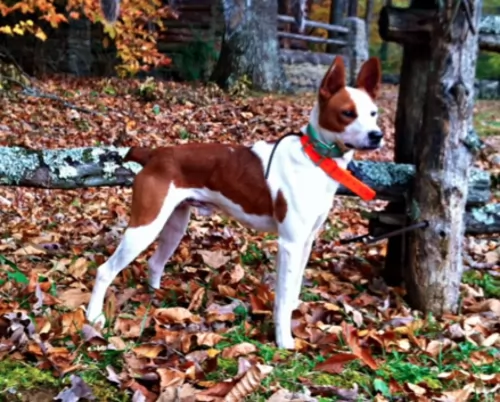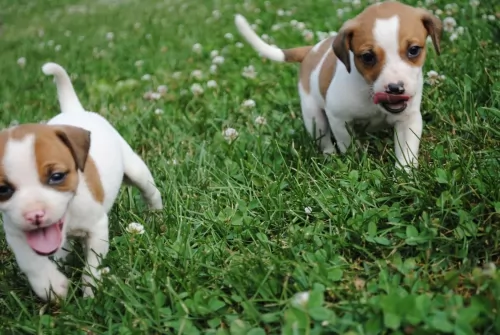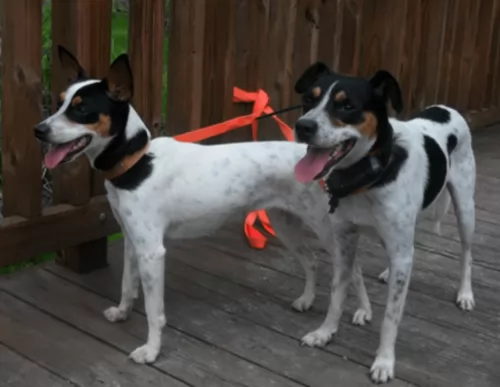 Petzlover
Petzlover Danish Swedish Farmdog is originated from Denmark but Mountain Feist is originated from United States. Danish Swedish Farmdog may grow 19 cm / 7 inches shorter than Mountain Feist. Danish Swedish Farmdog may weigh 42 kg / 92 pounds lesser than Mountain Feist. Danish Swedish Farmdog may live 3 years less than Mountain Feist. Danish Swedish Farmdog may have less litter size than Mountain Feist. Both Danish Swedish Farmdog and Mountain Feist requires Low Maintenance.
Danish Swedish Farmdog is originated from Denmark but Mountain Feist is originated from United States. Danish Swedish Farmdog may grow 19 cm / 7 inches shorter than Mountain Feist. Danish Swedish Farmdog may weigh 42 kg / 92 pounds lesser than Mountain Feist. Danish Swedish Farmdog may live 3 years less than Mountain Feist. Danish Swedish Farmdog may have less litter size than Mountain Feist. Both Danish Swedish Farmdog and Mountain Feist requires Low Maintenance.
 The Danish Swedish Farmdog has over the centuries been a versatile dog, working on farms. The history of this dog goes way back to the 1700s, being found in Denmark and Sweden where they originated.
The Danish Swedish Farmdog has over the centuries been a versatile dog, working on farms. The history of this dog goes way back to the 1700s, being found in Denmark and Sweden where they originated.
Today these dogs are also found in other countries. As life changed, the dog’s functions on the farm became less and the dog seemed to disappear somewhat. Both the Danish and Swedish Kennel Clubs worked together to bring back the breed, resulting in the first breed standard in 1987.
The Danish-Swedish Farmdog was also recorded in the American Kennel Club Foundation Stock Services in 2011. Today, most of these dogs are owned as family or companion dogs.
 In the Southern portion of North America, the Mountain Feist was developed. It is the Ozarks and Southern Appalachia that the Mountain Fiest calls his ancestral home. The breed dates back centuries and looks very much like a Jack Russell or rat terrier. George Washington, Abraham Lincoln and William Faulkner all featured the breed in their writings. For Washington it was his diary, Lincoln the poem “The Bear Hunt” and Faulkner “Go Down Moses”. These dogs, much like the Curs, were an important part of the early pioneer days in America.
In the Southern portion of North America, the Mountain Feist was developed. It is the Ozarks and Southern Appalachia that the Mountain Fiest calls his ancestral home. The breed dates back centuries and looks very much like a Jack Russell or rat terrier. George Washington, Abraham Lincoln and William Faulkner all featured the breed in their writings. For Washington it was his diary, Lincoln the poem “The Bear Hunt” and Faulkner “Go Down Moses”. These dogs, much like the Curs, were an important part of the early pioneer days in America.
The name Feist means a noisy, small dog in ancient languages. The Feist was developed in the South, the rural areas, in order to hunt and eliminate vermin and small prey animals. The breed was originally a cross between British terriers and hounds from Native Americans. Many others think the feist is not a breed but a type, a working dog which can vary individual to individual.
The Mountain Feist of today has been bred for hunting performance over generations of time. They hunt racoons, squirrel and rabbits among others. They can track even larger game. Other varieties of the feist include the Bench Legged Feist and the Pencil-tail Feist. This is an energetic working dog, curious, intelligent and alert. It is a loud, barky dog that needs to learn a “no bark” command or it may drive you crazy. The breed make good hunting dogs, watch dogs and companions.
The breed was recognized by the United Kennel Club (UKC) in 2015, but not by the AKC or American Kennel Club. Other breed organizations include the National Cur & Feist Breeder’s Association, The National Feist Breeder’s Association, The American Treeing Feist Association, and the Shadowtails Outdoors Group.
 Nobody could be blamed for thinking that the Danish Swedish Farmdog is a Fox Terrier, because he looks very similar. He also has a short, smooth coat which is odor-free and he is a wonderfully low maintenance breed. The coat does however shed throughout the year.
Nobody could be blamed for thinking that the Danish Swedish Farmdog is a Fox Terrier, because he looks very similar. He also has a short, smooth coat which is odor-free and he is a wonderfully low maintenance breed. The coat does however shed throughout the year.
The coat’s main color is white with patches of black, fawn or chocolate brown. He can also be tri-colored. He is a small to medium sized dog with a compact body, standing between 32 - 37 cm and weighing about 7 – 12kg. He has a deep chest while the head is lean, small and triangular shaped. The ears are semi erect or they can be floppy while the tail is long.
The Danish Swedish Farmdog is not only intelligent, but he has other excellent characteristics that make him such a splendid pet. He isn’t aggressive, he is playful, loving, loyal, social and energetic.
He therefore makes an exceptional pet. He is an amusing pet who will prove to be entertaining too. He loves being part of all the family’s activities and gets on well with children and pets in the home.
You want to be sure that you provide him with exercise and games so that he doesn’t become bored, frustrated and destructive. After all, he is a breed that is used to be busy and he won’t do well with a family who puts him in the back yard and just leaves him.
 The Mountain Feist is a medium sized dog with pointy ears that are long and fold over. With their sharp nails that are curved they can climb. Their hind legs are strong to support that activity as well. They have small, dark eyes, a black nose and a muzzle that is medium length and a round skull. The neck is strong, and they have a pretty deep chest. The Mountain Feist tail is bushy, high and erect. There coats come in a variety of colors including blue, black, white, red and brown with the brown being the most common.
The Mountain Feist is a medium sized dog with pointy ears that are long and fold over. With their sharp nails that are curved they can climb. Their hind legs are strong to support that activity as well. They have small, dark eyes, a black nose and a muzzle that is medium length and a round skull. The neck is strong, and they have a pretty deep chest. The Mountain Feist tail is bushy, high and erect. There coats come in a variety of colors including blue, black, white, red and brown with the brown being the most common.
There is a lot of variation of make up and type within the breed itself. Until the last decade or so the breed was fairly isolated among squirrel hunters and there was little cross breeding with other dogs. On the other hand, dogs in the regions where the Mountain Feist was isolated were crossed with them to give them the tree climbing ability, change their size, sharpen their senses or one particular sense and change their appearance.
This is why in different regions you will find Mountain Feist with attributes of the Curs, or the Elkhounds, the Terriers, Spitz or Coonhounds. This accounts for the various types of Mountain Feist Dogs.
 The Danish Swedish Farmdog has got everything going for him that makes him such a wonderful pet to have. He fits well into city- or country life, although wherever you live, you’ll need to ensure he is well exercised.
The Danish Swedish Farmdog has got everything going for him that makes him such a wonderful pet to have. He fits well into city- or country life, although wherever you live, you’ll need to ensure he is well exercised.
He is a child-friendly- and pet-friendly pet and he also happens to be low maintenance. You just need to brush him twice a week. You aren't likely to spend much on vet's fees with him either.In exchange for his love and devotion, make sure that you give every everything he needs to ensure his health and happiness.
 Yes, they very much enjoy playing with children.
Yes, they very much enjoy playing with children.
Tree climbing and stamina.
They need space and land on which to run every day. If you are in an apartment, make sure you have access to a dog park.
They are very intelligent and learn quickly. They love to please but can also be stubborn.
 Danish-Swedish Farmdogs have a lifespan ranging from 11 to 15 years. They are hardy dogs, not suffering from any breed specific genetic issues.
Danish-Swedish Farmdogs have a lifespan ranging from 11 to 15 years. They are hardy dogs, not suffering from any breed specific genetic issues.
However, it pays off to know of some of the common dog illnesses there are. If you provide your dog with high quality, nutritious food, good exercise and plenty of love and care, he can reach 15 years of age. Some of the more common dog illnesses to look out for -
It is always a good idea to have this testing for your dog. In fact, hip testing can spare you a great deal of anguish later on with your pet.
Hip dysplasia is a common skeletal disorder in dogs and although it is more prevalent in large dogs, smaller dogs can also get it.
You’ll notice your pet running with a strange gait and sometimes when he lies down, he’ll battle to get up again.
Recognizing the clinical signs of hip dysplasia is important to spare your dog a whole lot of pain, discomfort and even lameness.
 Like most breeds that are isolated, the Mountain Feist does not have a lot of known genetic health issues. They are generally healthy and known to live as many as eighteen years. Perhaps the biggest threat to their lives is the hunting accident, harming joints or paws in hunting situations or being attacked by a larger animal. There are no real genetic threat. Of course, with any dog that has folded ears there is always the possibility of infection or allergies. Keep their ears clean. The other possible concern is hip dysplasia in such an active dog. This can lead to lameness or arthritis. Obesity is another concern that could also lead to hip dysplasia.
Like most breeds that are isolated, the Mountain Feist does not have a lot of known genetic health issues. They are generally healthy and known to live as many as eighteen years. Perhaps the biggest threat to their lives is the hunting accident, harming joints or paws in hunting situations or being attacked by a larger animal. There are no real genetic threat. Of course, with any dog that has folded ears there is always the possibility of infection or allergies. Keep their ears clean. The other possible concern is hip dysplasia in such an active dog. This can lead to lameness or arthritis. Obesity is another concern that could also lead to hip dysplasia.
 The Danish Swedish Farmdog isn’t going to be requiring too much grooming. He has a short, smooth coat which actually repels dirt.
The Danish Swedish Farmdog isn’t going to be requiring too much grooming. He has a short, smooth coat which actually repels dirt.
Because his coat is odor-free, he certainly can get by without bathing. This is good news, as bathing a dog strips the skin of its natural oils. You can always just wipe his coat down with a damp cloth to rid it of dust and give his coat a good brushing twice a week to remove it of loose hairs.
It is always a good idea to check your pet’s ears to see that they remain free of debris and wax. There are ways and means to do this, and if you’re not sure how, your vet or doggy parlor can explain the process.
Check his nails to ensure they don’t get too long. This is prone to happen when your pet runs constantly on grass and doesn’t come into contact with a hard surface which files the nails down naturally.
Also, dental care is most important, and you need to brush your pet’s teeth 2 or 3 times a week with special toothpaste and toothbrush designed for dogs. Bad teeth don’t only affect the mouth of the dog, they can be detrimental to every part of your dog’s body.
 These are very active pups who need a high protein, high quality dry food. Feed a cup to a cup and half broken down into three meals daily. Do not overfeed your puppy.
These are very active pups who need a high protein, high quality dry food. Feed a cup to a cup and half broken down into three meals daily. Do not overfeed your puppy.
Feed the adult about two cups a day broken into two meals. Again, you are looking for a high quality, high protein dry food. Do not overfeed and watch for obesity.
This is a very active breed – a hunting dog with a lot of stamina, strength and energy. They need plenty of exercise as the terrier side of them is just a little hyper. They need at least two walks per day, and they are not great apartment dogs. They need both mental and physical stimulation. This little dog can keep going at a good rate for a long time.